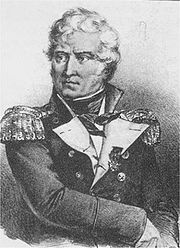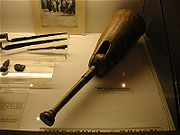
Józef Sowinski
Encyclopedia

Józef Sowiński was a Polish
Poland
Poland , officially the Republic of Poland , is a country in Central Europe bordered by Germany to the west; the Czech Republic and Slovakia to the south; Ukraine, Belarus and Lithuania to the east; and the Baltic Sea and Kaliningrad Oblast, a Russian exclave, to the north...
artillery general and one of the heroes of Poland's November 1830 Uprising
November Uprising
The November Uprising , Polish–Russian War 1830–31 also known as the Cadet Revolution, was an armed rebellion in the heartland of partitioned Poland against the Russian Empire. The uprising began on 29 November 1830 in Warsaw when the young Polish officers from the local Army of the Congress...
.
Biography
Józef Longin Sowiński was born March 15, 1777 WarsawWarsaw
Warsaw is the capital and largest city of Poland. It is located on the Vistula River, roughly from the Baltic Sea and from the Carpathian Mountains. Its population in 2010 was estimated at 1,716,855 residents with a greater metropolitan area of 2,631,902 residents, making Warsaw the 10th most...
, after graduating from the famous Corps of Cadets
Szkola Rycerska
Szkoła Rycerska or Akademia Szlachecka Korpusu Kadetów Jego Królewskiej Mości i Rzeczypospolitej was the first state school in the Polish-Lithuanian Commonwealth.-18th century:The state Corps of Cadets was established in Warsaw on 15 March 1765 by King Stanisław August...
in Warsaw, he joined the Polish Army as a lieutenant during the Kościuszko Uprising
Kosciuszko Uprising
The Kościuszko Uprising was an uprising against Imperial Russia and the Kingdom of Prussia led by Tadeusz Kościuszko in Poland, Belarus and Lithuania in 1794...
(1794). After its suppression and the dismemberment of Poland
Partitions of Poland
The Partitions of Poland or Partitions of the Polish–Lithuanian Commonwealth took place in the second half of the 18th century and ended the existence of the Polish–Lithuanian Commonwealth, resulting in the elimination of sovereign Poland for 123 years...
by her neighbor states, Sowiński's regiment was drafted into the Prussian
Kingdom of Prussia
The Kingdom of Prussia was a German kingdom from 1701 to 1918. Until the defeat of Germany in World War I, it comprised almost two-thirds of the area of the German Empire...
army. In 1807 he fought at the Battle of Eylau
Battle of Eylau
The Battle of Eylau or Battle of Preussisch-Eylau, 7 and 8 February 1807, was a bloody and inconclusive battle between Napoléon's Grande Armée and a Russian Empire army under Levin August, Count von Bennigsen near the town of Preußisch Eylau in East Prussia. Late in the battle, the Russians...
and received the highest military decoration of Prussia, the Pour le Mérite
Pour le Mérite
The Pour le Mérite, known informally as the Blue Max , was the Kingdom of Prussia's highest military order for German soldiers until the end of World War I....
. However, after the Duchy of Warsaw
Duchy of Warsaw
The Duchy of Warsaw was a Polish state established by Napoleon I in 1807 from the Polish lands ceded by the Kingdom of Prussia under the terms of the Treaties of Tilsit. The duchy was held in personal union by one of Napoleon's allies, King Frederick Augustus I of Saxony...
was proclaimed by Napoleon Bonaparte, Sowiński in 1811 returned into Polish service.
He fought in various battles of the Napoleonic wars
Napoleonic Wars
The Napoleonic Wars were a series of wars declared against Napoleon's French Empire by opposing coalitions that ran from 1803 to 1815. As a continuation of the wars sparked by the French Revolution of 1789, they revolutionised European armies and played out on an unprecedented scale, mainly due to...
. During Napoleon's invasion of Russia (1812) he lost a leg at the Battle of Mozhaysk. He was awarded the Virtuti Militari
Virtuti Militari
The Order Wojenny Virtuti Militari is Poland's highest military decoration for heroism and courage in the face of the enemy at war...
and Legion of Honor. After the Congress of Vienna
Congress of Vienna
The Congress of Vienna was a conference of ambassadors of European states chaired by Klemens Wenzel von Metternich, and held in Vienna from September, 1814 to June, 1815. The objective of the Congress was to settle the many issues arising from the French Revolutionary Wars, the Napoleonic Wars,...
he returned to Poland and served as commander of the Warsaw Arsenal of the Kingdom of Poland
Congress Poland
The Kingdom of Poland , informally known as Congress Poland , created in 1815 by the Congress of Vienna, was a personal union of the Russian parcel of Poland with the Russian Empire...
Army. In 1820 he became commandant of the Application School for officers.
After the outbreak of the November Uprising against Russia in 1830, Sowiński became artillery commander of the Warsaw garrison and head of the Government Commission of War (de facto Ministry of War). During the Russian assault on Warsaw on September 6, 1831, Sowiński personally commanded the heroic defense of the Polish capital's western approaches, in what is now its Wola
Wola
Wola is a district in western Warsaw, Poland, formerly the village of Wielka Wola, incorporated into Warsaw in 1916. An industrial area with traditions reaching back to the early 19th century, it is slowly changing into an office and residential district...
district (he had 1,300 men versus 11 Russian battalion
Battalion
A battalion is a military unit of around 300–1,200 soldiers usually consisting of between two and seven companies and typically commanded by either a Lieutenant Colonel or a Colonel...
s).
According to recent historians, just after the surrender negotiations he was bayonet
Bayonet
A bayonet is a knife, dagger, sword, or spike-shaped weapon designed to fit in, on, over or underneath the muzzle of a rifle, musket or similar weapon, effectively turning the gun into a spear...
ted to death by the Russians (who themselves publicized a story that he had been killed at his post in combat).
His death was immortalized by Polish poets, including Juliusz Słowacki
Juliusz Slowacki
Juliusz Słowacki was a Polish Romantic poet. He is considered one of the "Three Bards" of Polish literature — a major figure in the Polish Romantic period, and the father of modern Polish drama. His works often feature elements of Slavic pagan traditions, Polish history, mysticism and orientalism....
in his Sowiński w okopach Woli (Sowiński in the Wola Trenches).

External links
- Sowiński in the trenches of Wola - a poem by Juliusz Słowacki translated by Walter WhippleWalter WhippleWalter Whipple is a Teaching Professor Emeritus of Polish in the Department of Germanic and Slavic Languages of Brigham Young University in Provo, Utah...

